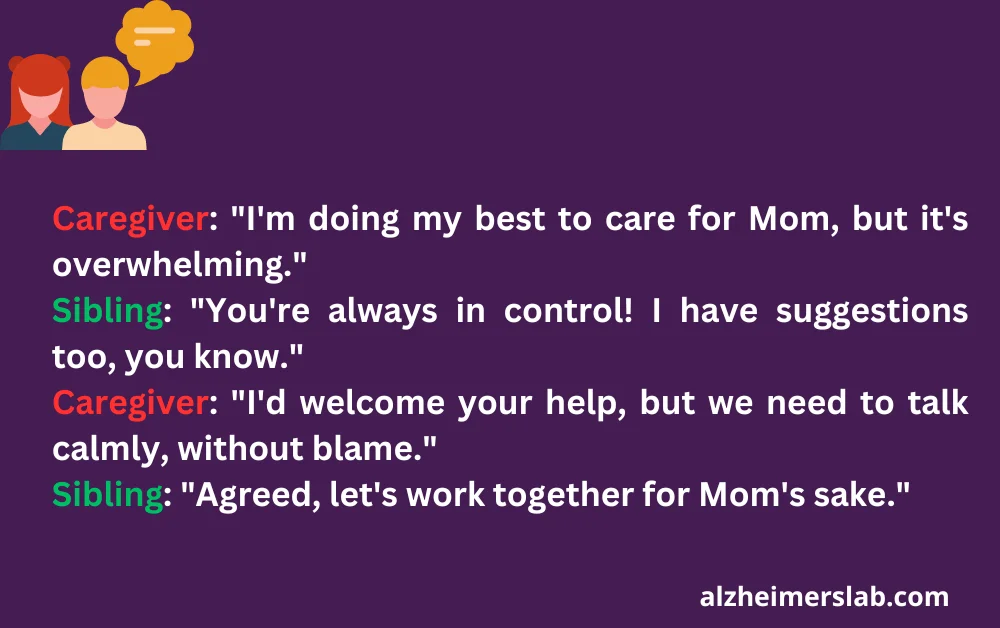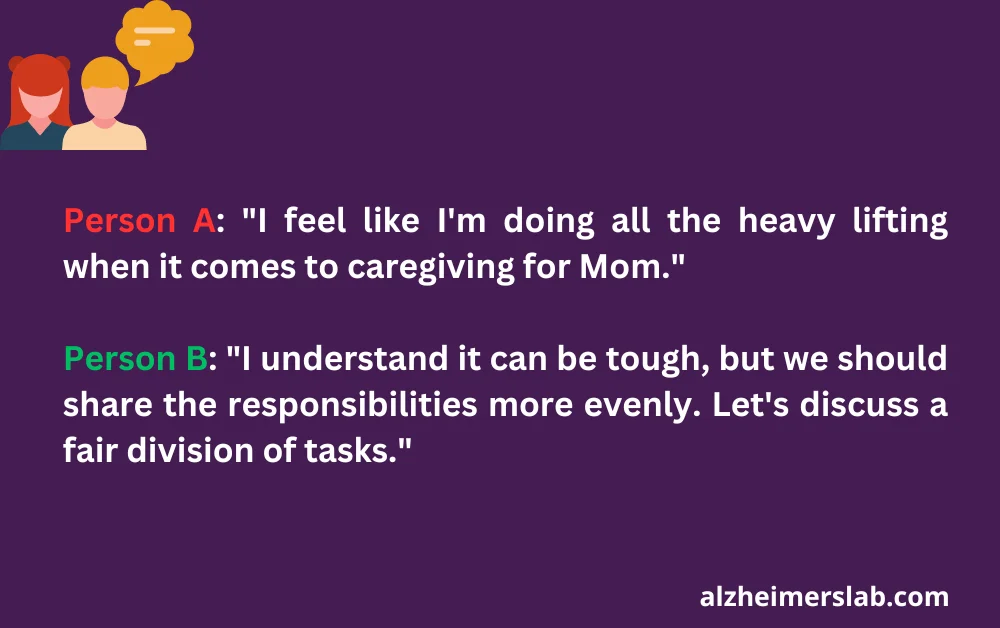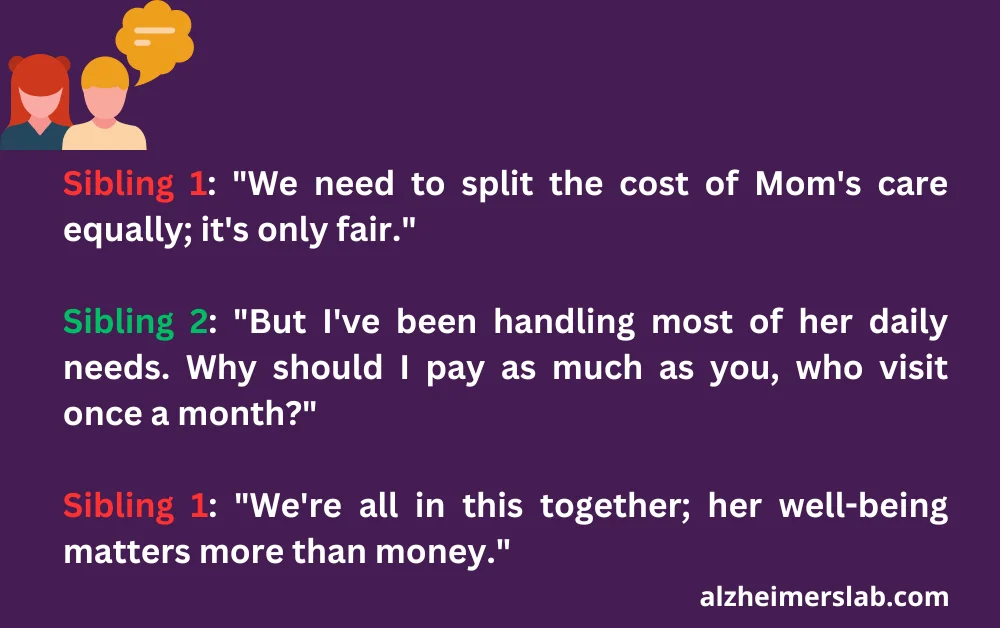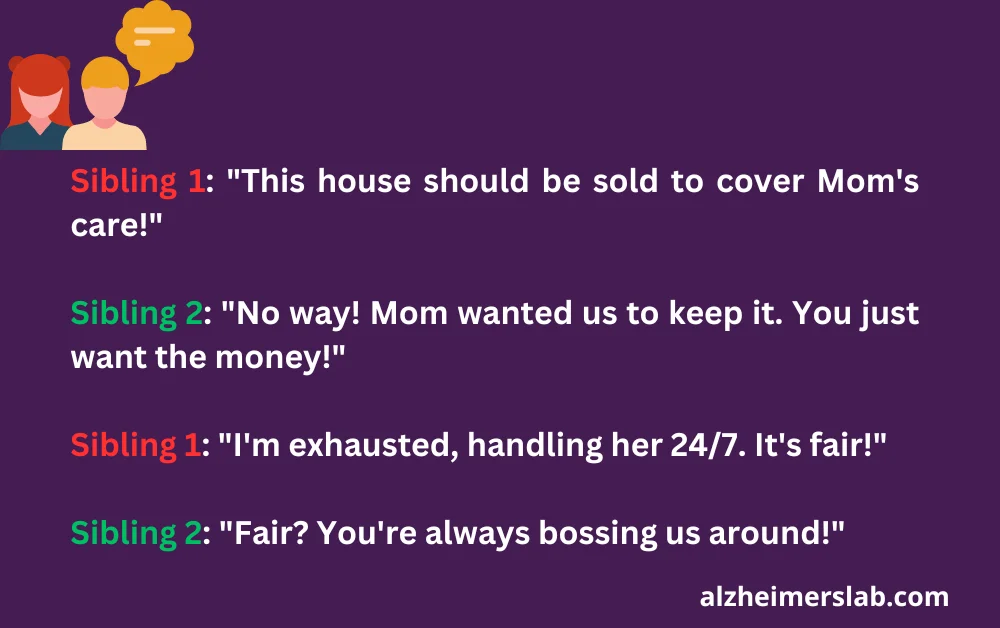How to Deal with Sibling Conflicts in Dementia Caregiving
When our loved ones are affected by dementia, caregiving becomes a shared responsibility. But often, this shared responsibility can lead to conflicts among siblings. In this article, I will walk you through practical strategies and tips on how to deal with sibling conflicts in dementia caregiving. Whether you’re currently facing these challenges or preparing for the future, I’m here to offer guidance and support.
Understanding Dementia
Before we delve into the dynamics of sibling conflicts, let’s briefly understand dementia.
Dementia is not just memory loss; it’s a complex brain disorder that affects a person’s ability to think, communicate, and perform daily activities. It can be challenging for the individual and the family. We must recognize that caring for someone with dementia is a significant undertaking, often requiring a united effort.
Acknowledging Differences
Every sibling is unique, and these differences can lead to misunderstandings. Some may live nearby, while others are far away. Some might be financially stable, while others struggle. Recognizing and respecting these differences is crucial.
Example: Let’s say I have two siblings, Sarah and David. Sarah lives in the same town as our parents, and I live in a different state. David, on the other hand, has a demanding job that leaves him with limited free time. Our individual situations can create different perspectives and expectations on how we should contribute to caregiving.
Open and Honest Communication
Communication is the key to resolving conflicts. Encourage open and honest discussions among siblings. Share your concerns, needs, and expectations without blame or judgment.
Example: When Sarah, David, and I sat down to discuss our parents’ care, I expressed my desire to contribute financially since I couldn’t be there physically. Sarah and David, in turn, shared their concerns about not being able to take time off from work as often as they’d like. This dialogue allowed us to better understand each other’s challenges and expectations.
Define Roles and Responsibilities
To avoid conflicts, it’s crucial to define clear roles and responsibilities. Decide who will handle medical appointments, daily care, financial matters, and emotional support. This clarity prevents overlapping responsibilities and misunderstandings.
Example: In our family meeting, we divided caregiving tasks according to our strengths and availability. Sarah took charge of organizing medical appointments, while David handled financial matters. I provided emotional support by calling our parents regularly and offering advice on dementia care.
Seek Professional Advice
Sometimes, sibling conflicts stem from disagreements about the best approach to care. In such cases, it can be helpful to seek advice from professionals like doctors, social workers, or dementia care experts.
Example: Our parents’ doctor recommended a specialized dementia care program. While Sarah was initially skeptical, the expert’s endorsement helped us all understand the benefits of this program, leading to a consensus.
Set Boundaries
Caring for a loved one with dementia can be emotionally draining. It’s essential to set boundaries to prevent burnout and resentment. Agree on limits for each sibling’s involvement and respect these boundaries.
Example: Sarah, David, and I decided that we would each take turns spending a weekend with our parents, giving the primary caregiver some much-needed respite. This rotation ensured that no one felt overwhelmed.
Embrace Flexibility
Dementia is unpredictable, and caregiving needs can change rapidly. Embrace flexibility in your caregiving plan. Be ready to adapt and support each other during challenging times.
Example: Our parents’ condition deteriorated suddenly, requiring more extensive care. Instead of blaming each other for not foreseeing this, we rallied together, rearranged our schedules, and found a solution that worked for everyone.
Financial Transparency
Money matters can be a significant source of conflict among siblings. Be transparent about financial decisions and expenses related to dementia care. Keep detailed records and ensure everyone has access to this information.
Example: To avoid misunderstandings, we set up a shared online document where we tracked all expenses related to our parents’ care. This transparency helped us maintain trust and accountability.
Resolve Conflicts Amicably
Conflicts are bound to arise, but it’s essential to resolve them amicably. Avoid heated arguments or blaming each other. Instead, focus on finding compromises that benefit your loved one with dementia.
Example: When Sarah and David disagreed on the choice of a care facility, we decided to visit several together and discuss the pros and cons. This collaborative approach allowed us to make a well-informed decision that satisfied everyone’s concerns.
Self-Care
Don’t forget to take care of yourselves. Caregiving can be emotionally draining, and it’s easy to neglect your own needs. Encourage each other to practice self-care and seek support when needed.
Example: There were times when I felt overwhelmed by the emotional toll of caregiving from a distance. Sarah and David reminded me to take breaks, speak to a counselor, and lean on my friends for support.
Should I take legal action against my sibling?

First and foremost, it’s crucial to remember that legal action should be a last resort. It’s generally best to try to resolve conflicts through communication and compromise. Sit down with your sibling and have an open, honest conversation about your concerns and feelings. Share your perspective and listen to theirs. This can often lead to a better understanding of each other’s viewpoints and a resolution to your disagreements.
If, despite your best efforts, you cannot reach an agreement and your sibling’s actions are causing significant harm to your loved one or their finances, you may need to consider legal action. Legal action can take various forms, such as seeking guardianship or conservatorship, or even filing a lawsuit if your sibling is misusing your loved one’s assets or neglecting their care.
Guardianship or conservatorship involves going to court to request the legal authority to make decisions on behalf of your loved one, especially if they are unable to make decisions themselves. This step should not be taken lightly, as it can be emotionally and financially draining. Courts generally prefer to keep decision-making within the family, so try to involve all siblings in the decision-making process.
If financial abuse or neglect is suspected, you may want to consult with an attorney specializing in elder law. They can help you explore your legal options and guide you through the process of gathering evidence if needed.
What’s the reason behind caregiver-sibling resentment?

Caring for a loved one with dementia is a tough job. When siblings are involved in taking care of their mom or dad with dementia, it can sometimes lead to problems between them. This is known as caregiver-sibling resentment. Let’s explore why this happens.
1. Different Perspectives
One big reason for resentment is that siblings often have different views on how to care for their parent. Each sibling might think their way is the best. This can lead to arguments and hurt feelings. For example, one sibling might want to keep their parent at home, while another believes a care facility is better.
2. Uneven Contributions
Another common issue is when one sibling does most of the caregiving work. They might be the one who lives closest to their parent or has more time to spare. This can make the other siblings feel like they’re not doing their fair share. Resentment grows when some siblings feel like they’re carrying the whole load.
3. Old Grudges and Rivalries
Sometimes, sibling rivalry from childhood can resurface when caring for a parent with dementia. Old grudges and competition can get in the way of cooperation. Siblings may find it hard to put aside their past differences and work together.
4. Financial Strain
The cost of dementia care can be high. Deciding who should pay for what can lead to disagreements. One sibling might feel that they’re shouldering more of the financial burden and become resentful.
5. Lack of Communication
Not talking openly about caregiving responsibilities and decisions can also lead to problems. Siblings might make assumptions about what others are doing or feeling, which can create misunderstandings and hard feelings.
6. Stress and Exhaustion
Caring for someone with dementia is emotionally and physically draining. Siblings can become stressed and exhausted, which can make them irritable and less patient with each other.
7. Guilt and Grief
Watching a parent struggle with dementia can be heartbreaking. Siblings may feel guilty about not being able to do more or grieve for the loss of their parent’s former self. These emotions can turn into resentment if not properly addressed.
In conclusion, caregiver-sibling resentment often arises from a mix of different perspectives, unequal contributions, unresolved issues from the past, financial strain, poor communication, stress, and complex emotions.
I do all the heavy lifting, my sibling doesn’t contribute anything. What should I do?

First, try to have an open and honest conversation with your sibling. Share your feelings and concerns calmly and respectfully. Sometimes, misunderstandings or lack of communication can lead to one sibling feeling overwhelmed with caregiving responsibilities.
It’s essential to listen to your sibling’s perspective too. They might have reasons for not being able to contribute as much as you’d like. Maybe they have other commitments, don’t fully understand the situation, or simply need more information about your caregiving responsibilities.
If your sibling is unable to provide direct assistance, try to find other ways they can support you. They might be able to handle paperwork, coordinate appointments, or contribute financially. Finding a division of responsibilities that works for both of you can ease the burden on the primary caregiver.
Consider involving a neutral third party, like a mediator or a counselor, to facilitate the conversation. They can help keep the discussion productive and ensure both parties feel heard and understood.
If despite your efforts, your sibling still isn’t willing to contribute or be involved, it might be necessary to reassess the caregiving situation. You could consider seeking additional help from outside sources, such as hiring a professional caregiver or looking into respite care options.
Remember, caregiving can be overwhelming, and it’s okay to ask for help and set boundaries to protect your well-being. Taking care of yourself is crucial in providing the best care for your loved one with dementia.
There’s a lot of argument in my family about paying for an aging parent’s care. How do I resolve it?

First, it’s important to understand why these conflicts happen. Money can be a touchy subject, and caregiving can be expensive. Sometimes, siblings might feel like they’re contributing more than others, which can lead to arguments.
Communication is key. You should sit down with your siblings and have an open and honest conversation. Share your thoughts and listen to theirs. Try to understand their concerns and perspectives. Maybe one sibling doesn’t have much money to spare, or another thinks they’re doing more work than the rest.
Creating a budget together can help. Calculate all the expenses related to your parent’s care. This includes medical bills, medications, home modifications, and caregiver costs. Then, divide these costs among the siblings based on their financial abilities. Make sure it’s fair for everyone.
Consider outside help, like a financial advisor. Sometimes, having a neutral third party can make it easier to find a solution. They can provide advice and help you make a plan that works for everyone.
Think about your parent’s wishes. What would they want? It’s important to consider their opinions and choices, even if they can’t express them clearly due to dementia. This can guide your decisions and ease conflicts.
Ultimately, remember that the goal is to provide the best care for your aging parent. Try to keep the focus on their well-being rather than personal disputes. It might take time and patience, but with open communication and a willingness to compromise, you can find a solution that works for everyone and ensures your parent gets the care they need.
Inheritance conflicts have begun to emerge in my home. How do I deal with it?

Caring for a loved one with dementia is a tough journey. You’re not alone if you find yourself facing inheritance conflicts along the way. These conflicts can create more stress during an already challenging time. Let’s talk about how you can handle these situations and understand them better.
1. Unfair Division of Assets
Imagine this: Your parents have dementia, and you have siblings. Your family home is a significant asset, and you’re worried about how it will be divided. One sibling may want to sell it quickly to cover care costs, while another may want to hold onto it for sentimental reasons. It’s crucial to have an open conversation about everyone’s concerns. Consider getting legal advice to ensure fairness in asset division.
2. Control Over Financial Decisions
In this scenario, your sibling might have assumed control over your parent’s finances and refuses to involve you in decisions. This can be frustrating, especially if you suspect they are mishandling funds. Start by trying to talk to your sibling calmly. If that doesn’t work, consult an elder care attorney or a financial advisor to understand your rights and explore options for oversight.
3. Disagreements Over Healthcare Choices
Dementia often requires complex medical decisions. You and your siblings might disagree on the best course of action. To address this, maintain open communication. Share information about your parent’s condition and preferences. If needed, consult the medical team for guidance. Remember, it’s about what’s best for your parent, not who’s right.
4. Wills and Legal Documents
Sometimes, conflicts arise over your parent’s will or other legal documents. Perhaps one sibling believes they are unfairly excluded or that the will is not valid due to your parent’s dementia. It’s essential to consult an attorney who specializes in elder law to navigate these issues. They can help ensure the will is valid and that everyone’s interests are considered.
5. Uncovering Hidden Assets
Discovering hidden assets can be unsettling. Your sibling might have been secretly taking money or possessions. In this situation, document any evidence you find discreetly. Seek legal advice to address the issue properly and protect your parent’s interests.
In all these scenarios, communication is key. Try to have open, honest discussions with your siblings. If that doesn’t work, consider involving a mediator or therapist. Remember that caregiving is challenging, and emotions can run high.
Conclusion
In the journey of dementia caregiving, sibling conflicts are common but manageable. By understanding dementia, acknowledging differences, and fostering open communication, we can build a united front to provide the best care for our loved ones.
Remember to define roles, seek professional advice when necessary, and maintain financial transparency. Set boundaries, embrace flexibility, and resolve conflicts amicably. Most importantly, don’t forget to take care of yourselves.
Now, I’d love to hear from you. Have you faced sibling conflicts while caregiving for a loved one with dementia? How did you resolve them? Please share your experiences and tips in the comments section below.
